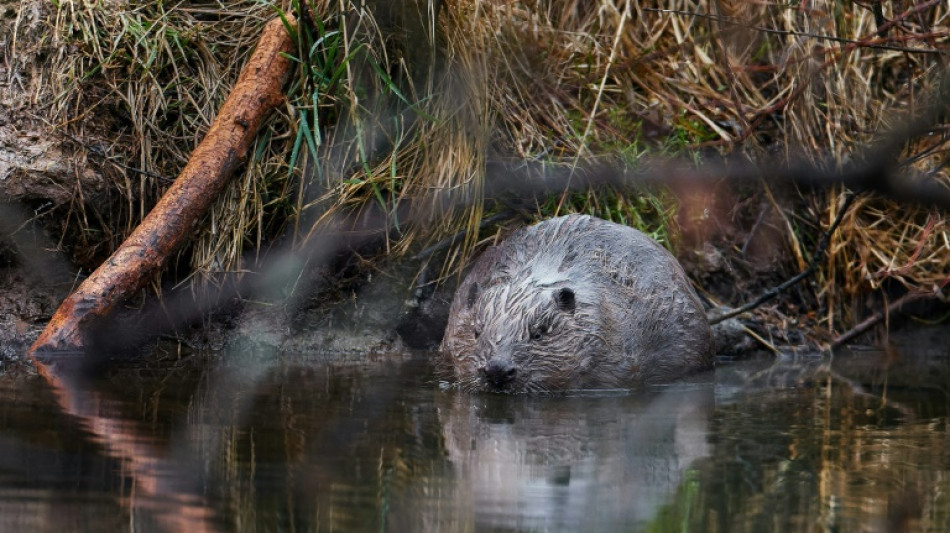
-
 US military assets in the Middle East
US military assets in the Middle East
-
Neymar hints at possible retirement after World Cup

-
 Stocks rise after court ruling against US tariffs
Stocks rise after court ruling against US tariffs
-
Australia end dismal T20 World Cup by thrashing Oman

-
 Olympics chief says Milan-Cortina has set new path for Games
Olympics chief says Milan-Cortina has set new path for Games
-
Russian SVR spy agency took over Wagner 'influence' ops in Africa: report

-
 Pegula fights back to sink Anisimova and reach Dubai final
Pegula fights back to sink Anisimova and reach Dubai final
-
Trump administration denounces 'terrorism' in France after activist's killing

-
 Colombia's Medellin builds mega-prison inspired by El Salvador's CECOT
Colombia's Medellin builds mega-prison inspired by El Salvador's CECOT
-
German broadcaster recalls correspondent over AI-generated images

-
 US Supreme Court strikes down swath of Trump global tariffs
US Supreme Court strikes down swath of Trump global tariffs
-
England's Itoje says managing 'emotional turmoil' key to 100 cap landmark

-
 Trump says weighing strike on Iran as Tehran says draft deal coming soon
Trump says weighing strike on Iran as Tehran says draft deal coming soon
-
Tudor is '100 percent' certain of saving Spurs from relegation

-
 Azam dropped for scoring too slowly, says Pakistan coach Hesson
Azam dropped for scoring too slowly, says Pakistan coach Hesson
-
Stocks volatile after soft US growth data, court ruling against tariffs

-
 Italy bring back Capuozzo for France Six Nations trip
Italy bring back Capuozzo for France Six Nations trip
-
From Malinin's collapse to Liu's triumph: Top Olympic figure skating moments

-
 Arteta urges Arsenal to 'write own destiny' after title wobble
Arteta urges Arsenal to 'write own destiny' after title wobble
-
Ukraine Paralympics team to boycott opening ceremony over Russian flag decision

-
 Wales captain Lake wants fans to bring 'noise' against Scotland
Wales captain Lake wants fans to bring 'noise' against Scotland
-
Skier Vonn's Italian hospital a hotbed of men, sister says

-
 India target S.Africa top order, Abhishek to come good: bowling coach
India target S.Africa top order, Abhishek to come good: bowling coach
-
Carrick praises Man Utd 'diversity' after Ratcliffe's immigrant rant

-
 I never thought it would be hit, says 'Scream' creator 30 years later
I never thought it would be hit, says 'Scream' creator 30 years later
-
AI summit statement delayed to 'maximise' signatories: India

-
 Barcelona's Sagrada Familia basilica hits peak height
Barcelona's Sagrada Familia basilica hits peak height
-
Milan sprints to second straight UAE stage win as Tiberi keeps lead

-
 US GDP growth misses expectations as Trump blames shutdown
US GDP growth misses expectations as Trump blames shutdown
-
Benfica investigate video of fans' monkey gestures

-
 French minister pledges tight security at rally for killed activist
French minister pledges tight security at rally for killed activist
-
Guardiola 'couldn't care less' about Arsenal stumble in title race

-
 UK police search property as royals reel from Andrew's arrest
UK police search property as royals reel from Andrew's arrest
-
Germany's Merz to visit China next week

-
 Kompany says Mourinho made 'huge mistake' in Vinicius racism row
Kompany says Mourinho made 'huge mistake' in Vinicius racism row
-
X appeals EU's 120-mn-euro fine over digital content violations

-
 Galthie recalls hulking locks Flament, Meafou for Italy
Galthie recalls hulking locks Flament, Meafou for Italy
-
Turkey, Saudi sign major solar power deal

-
 US Olympic freeskier Hess embraces 'loser' tag after Trump blast
US Olympic freeskier Hess embraces 'loser' tag after Trump blast
-
European stocks rebound, oil prices ease after US-Iran volatility

-
 'Alpha male' AI world shuts out women: computing prof Hall
'Alpha male' AI world shuts out women: computing prof Hall
-
New Zealand freestyle skier Ives in hard Olympic crash

-
 New Zealand must adapt quickly to Sri Lanka wickets: Chapman
New Zealand must adapt quickly to Sri Lanka wickets: Chapman
-
Thai activist's jail term for royal insult extended to 30 years

-
 Families of Duterte's drug war victims eye Hague hearing with hope
Families of Duterte's drug war victims eye Hague hearing with hope
-
India chases 'DeepSeek moment' with homegrown AI

-
 UN touts panel for 'human control' of AI at global summit
UN touts panel for 'human control' of AI at global summit
-
Ukraine Paralympics team to boycott Opening Ceremony over Russian flag decision: statement

-
 UK monarchy reels from Andrew's stunning arrest
UK monarchy reels from Andrew's stunning arrest
-
Somaliland, where Muslims love Israel


Many animal 'geomorphs' under threat, study warns
More than a quarter of our planet's natural "geomorphs" -- animals such as beavers and hippos that, collectively, can reshape entire landscapes -- are threatened or have shrinking populations, a new study says.
The research, by Queen Mary University of London, found the scale of the impact these animals had on habitats -- by building dams, trampling new river courses, excavating earth and other activities -- rivals that caused by major floods.
Yet "more than a quarter (28 percent) of zoogeomorphic species are vulnerable to future population decline or regional or global extinction," the study's authors warned.
Their research, published mid-February, identified more than 600 species of land and freshwater animals that worked to redesign their ecosystems.
While beavers, of dam-building fame, and hippopotamuses and elephants, which in herds can flatten stretches of earth, are the best-known, there are many others -- often overlooked -- that could also be dubbed animal architects.
Among them are Brazilian termites, which have built high mounds connected by tunnels that cover an area larger than Iceland.
Others identified by the researchers included Australian marsupials, South American shrimp, Asian ants, as well as salmon, moles, earthworms and freshwater insects.
"What we tend to do is overlook the smaller animals that are less visible to us. Perhaps they're living underground or they're living underwater, but those animals can be really kind of important as well," one of the authors, Gemma Harvey, told AFP.
- 'Big cumulative effect' -
Harvey, a professor in biogeomorphology and landscape rewilding, said: "People can underestimate the effects of small animals, because individually their effects are small, but collectively they tend to be more abundant in the landscape so they can have a big cumulative effect."
She added that "it's the collective importance of the animals that is being discovered right now".
She noted the study did not look at marine ecosystems, and that "there will be many more animals that have not yet been studied or perhaps not even been discovered yet".
Of the more than 600 species identified in the research, 57 were classed as endangered, vulnerable or near-threatened on the International Union for the Conservation of Nature's Red List of Threatened Species.
Many others were at risk of declining populations.
"As we lose species from our landscapes, we lose those unique processes" of reshaping the habitats, Harvey said.
And the power these landscaping animals possess is staggering.
Harvey said her team's study estimated that the species they had identified together exerted 76,000 gigajoules of energy each year -- equivalent to that of "hundreds of thousands of extreme floods".
She said much was still unknown about the animals' geomorphing processes and she planned to further her research, notably by factoring in the effects of climate change.
"We're also interested in thinking kind of back in time in the past, about what we've already lost, you know, from our landscapes as species have become extinct or reduced a lot in terms of their population," she said.
Y.Nakamura--AMWN


